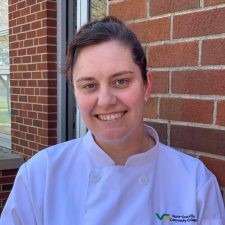This website uses cookies so that we can provide you with the best user experience possible. Cookie information is stored in your browser and performs functions such as recognising you when you return to our website and helping our team to understand which sections of the website you find most interesting and useful.
Associate In Arts In Teacher Preparation

Program Description
The Associate in Arts in Teacher Preparation degree shall be granted for a planned program of study consisting of a minimum of 60 semester hours of credit (SHC) of college transfer courses. Within the degree program, the institution shall include opportunities for the achievement of competence in reading, writing, oral communication, fundamental mathematical skills, and basic computer use.
The Comprehensive Articulation Agreement (CAA) and the Independent Comprehensive Articulation Agreement (ICAA) enables North Carolina community college graduates of two-year associate in arts programs who are admitted to constituent institutions of The University of North Carolina and to Signatory Institutions of North Carolina Independent Colleges and Universities to transfer with junior status.
Community college graduates must obtain a grade of “C” or better in each course and an overall GPA of at least 2.7 on a 4.0 scale in order to transfer with a junior status. Courses may also transfer through bilateral agreements between institutions.
| Program Name | Credit Hours | Program Type |
|---|---|---|
| Associate in Arts Teacher Preparation Degree A1010T (Course Sequence) | 60 |
Program Details
Discover the specifics of our programs, including required courses, course sequence, pathways, and learning outcomes.
Vance-Granville Community College has joined the “Scholar of Global Distinction” program, a partnership between community colleges and UNC World View, a public service program of the University of North Carolina at Chapel Hill.
As a “Scholar of Global Distinction” college, VGCC will allow students the opportunity to earn a “Graduated with Global Distinction” notation on their transcripts by:
- Completing at least 15 credit hours of globally intensive courses;
- Participating in eight international activities and dialogues;
- Gaining 30 hours of global experience in a study abroad or domestic intercultural experience; and
- Completing a capstone presentation related to their two-year global learning experience.
Examples of globally intensive courses are foreign language courses, as well as courses with “World,” “Global,” “International,” “Comparative” or “Cultural” in the course title.
The program seeks to develop students’ abilities to:
- Investigate the world beyond their immediate environment, framing significant problems and conducting well-crafted and age-appropriate research;
- Recognize perspectives, others’ and their own, articulating and explaining such perspectives thoughtfully and respectfully;
- Communicate ideas effectively with diverse audiences, bridging geographic, linguistic, ideological, and cultural barriers; and
- Reflect critically on their role as a member of the global community and pursue ways to create positive change.
For more information, contact VGCC’s World View liaisons: instructor Frankie K. Frink at frinkf@vgcc.edu or 919-528-4737; and instructor Jason Damon Bryan at bryanj@vgcc.edu or 252-738-3538.
- Communication Skills: Communicate effectively through writing and speaking.
- Quantitative Reasoning: Understand and apply mathematical concepts and interpret numerical data.
- Critical Thinking: Evaluate the relevance and validity of information in order to draw logical and useful conclusions.
- Technological Skills: Use technology to acquire and share information.
- Global and Cultural Awareness: Demonstrate an understanding of global and cultural diversity, events, and issues.
- Occupational Skills: Demonstrate knowledge and skills necessary for entry level positions or continued education in a field of study.

“I have had an amazing time in this program! Made some friends, learned so much, and had some great experiences.”

